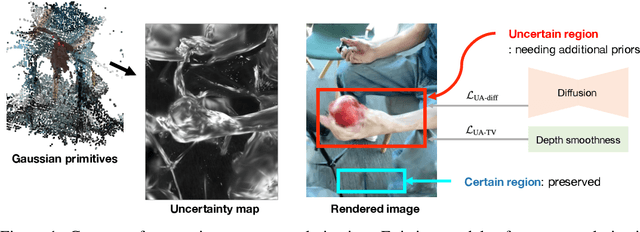Mijeong Kim
4D Gaussian Splatting in the Wild with Uncertainty-Aware Regularization
Nov 13, 2024



Abstract:Novel view synthesis of dynamic scenes is becoming important in various applications, including augmented and virtual reality. We propose a novel 4D Gaussian Splatting (4DGS) algorithm for dynamic scenes from casually recorded monocular videos. To overcome the overfitting problem of existing work for these real-world videos, we introduce an uncertainty-aware regularization that identifies uncertain regions with few observations and selectively imposes additional priors based on diffusion models and depth smoothness on such regions. This approach improves both the performance of novel view synthesis and the quality of training image reconstruction. We also identify the initialization problem of 4DGS in fast-moving dynamic regions, where the Structure from Motion (SfM) algorithm fails to provide reliable 3D landmarks. To initialize Gaussian primitives in such regions, we present a dynamic region densification method using the estimated depth maps and scene flow. Our experiments show that the proposed method improves the performance of 4DGS reconstruction from a video captured by a handheld monocular camera and also exhibits promising results in few-shot static scene reconstruction.
Generative Neural Fields by Mixtures of Neural Implicit Functions
Oct 30, 2023



Abstract:We propose a novel approach to learning the generative neural fields represented by linear combinations of implicit basis networks. Our algorithm learns basis networks in the form of implicit neural representations and their coefficients in a latent space by either conducting meta-learning or adopting auto-decoding paradigms. The proposed method easily enlarges the capacity of generative neural fields by increasing the number of basis networks while maintaining the size of a network for inference to be small through their weighted model averaging. Consequently, sampling instances using the model is efficient in terms of latency and memory footprint. Moreover, we customize denoising diffusion probabilistic model for a target task to sample latent mixture coefficients, which allows our final model to generate unseen data effectively. Experiments show that our approach achieves competitive generation performance on diverse benchmarks for images, voxel data, and NeRF scenes without sophisticated designs for specific modalities and domains.
InfoNeRF: Ray Entropy Minimization for Few-Shot Neural Volume Rendering
Dec 31, 2021



Abstract:We present an information-theoretic regularization technique for few-shot novel view synthesis based on neural implicit representation. The proposed approach minimizes potential reconstruction inconsistency that happens due to insufficient viewpoints by imposing the entropy constraint of the density in each ray. In addition, to alleviate the potential degenerate issue when all training images are acquired from almost redundant viewpoints, we further incorporate the spatially smoothness constraint into the estimated images by restricting information gains from a pair of rays with slightly different viewpoints. The main idea of our algorithm is to make reconstructed scenes compact along individual rays and consistent across rays in the neighborhood. The proposed regularizers can be plugged into most of existing neural volume rendering techniques based on NeRF in a straightforward way. Despite its simplicity, we achieve consistently improved performance compared to existing neural view synthesis methods by large margins on multiple standard benchmarks. Our project website is available at \url{http://cvlab.snu.ac.kr/research/InfoNeRF}.
 Add to Chrome
Add to Chrome Add to Firefox
Add to Firefox Add to Edge
Add to Edge